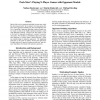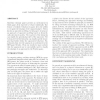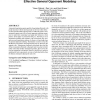126
click to vote
AIIDE
2009
15 years 3 months ago
2009
Although in theory opponent modeling can be useful in any adversarial domain, in practice it is both difficult to do accurately and to use effectively to improve game play. In thi...
163
click to vote
MLMTA
2003
15 years 3 months ago
2003
Abstract— The prediction of the future states in MultiAgent Systems has been a challenging problem since the begining of MAS. Robotic soccer is a MAS environment in which the pre...
AAAI
2006
15 years 3 months ago
2006
Much of the work on opponent modeling for game tree search has been unsuccessful. In two-player, zero-sum games, the gains from opponent modeling are often outweighed by the cost ...
142
click to vote
GAMEON
2007
15 years 3 months ago
2007
Real-time strategy games present an environment in which game AI is expected to behave realistically. One feature of realistic behaviour in game AI is the ability to recognise the...
130
click to vote
IDEAL
2009
Springer
15 years 6 months ago
2009
Springer
Opponent modeling is a skill in multi-agent systems (MAS) which attempts to create a model of the behavior of the opponent. This model can be used to predict the future actions of ...
131
click to vote
GECCO
2007
Springer
15 years 8 months ago
2007
Springer
Opponent models are necessary in games where the game state is only partially known to the player, since the player must infer the state of the game based on the opponent’s acti...
108
Voted
ATAL
2009
Springer
15 years 8 months ago
2009
Springer
Automated negotiation agents capable of negotiating efficiently with people must deal with the fact that people are diverse in their behavior and each individual might negotiate ...



